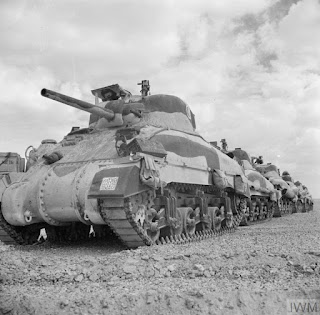Eighty years ago the fall of Tobruk brings Churchill humiliation and the promise of better tanks
Churchill travelled again to Washington to talk to President Roosevelt. Unlike their other meetings no codename was given to this one as the discussions between delegations of military leaders were the principal forum and the summit conversation was treated as informal. The talks focused on helping the Soviet Union; there was no firm conclusion on coordinating military strategy. Churchill resisted US enthusiasm for an invasion of the Continent even as early as later that year. Churchill steered the Americans towards joint operations in the Mediterranean.
Whilst he was in Washington Churchill had the mortification of learning that Tobruk had fallen to Rommel's advancing Axis troops after they had breached the British Gazala line leaving the fortress isolated. The South African and British garrison held out for only three days before surrendering with 33,000 men. It was the last and, possibly, the most bitter in the string of military humiliations suffered by Britain since the start of the year. Churchill's one consolation from the debacle was that Roosevelt accepted his plea for deliveries of the new M4 Sherman tanks which were markedly superior to most British designs.
The fall of Tobruk gave fresh impetus to Churchill's domestic political opponents. A full scale Commons debate was practically inevitable but the long-standing Chamberlainite diehard MP, Sir John Wardlaw-Milne floated a proposal to subject the government to a vote of no confidence. Unlike the January vote which had been Churchill's initiative to pre-empt criticism, this one showed how far he had been pushed into a corner. The only thing on Churchill's side was that the need to return from America postponed action by a couple of days.
Erwin Rommel was promoted to Field-Marshal, at 49 the youngest in the German army, by a delighted Fuehrer. This set the seal on his image as an astute commander, easily capable of outfighting apparently inept British generals. The only malign effect on Axis stratgy of his desert vicotry was to appear to make the invasion of Malta redundant as the British line was pushed further eastwards raising hopes that they would be thrown out of Egypt.
Pierre Laval, the Vichy prime minister, made a speech in which he expressed the wish that Germany would win the war so as to prevent the victory of Bolshevism. This marked him as a man who went far beyond what orderly collaboration with the Germans required. Marshal Petain's only influence on the speech was to insist that Laval change his original statement of "confidence in German victory" as this strayed inappropriately into matters of military judgement. Many of the French were appalled and the Gaullists exulted.
,+1st+Armoured+Division,+at+El+Alamein,+24+October+1942.IWM+(E+18377)..jpg)


Comments
Post a Comment